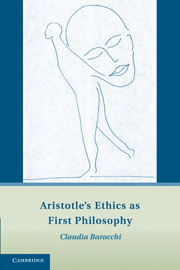Book contents
- Frontmatter
- Contents
- Acknowledgments
- Introduction
- 1 Prelude: Before Ethics. Metaphysics A and Posterior Analytics B.19
- 2 Main Section. Ēthikōn Nikomakheiōn Alpha to Eta
- 3 Interlude. Metaphysics Gamma
- 4 Concluding Section. Ēthikōn Nikomakheiōn Theta to Kappa
- 5 Kolophon
- Selected Bibliography
- Index of Passages
- Index of Subjects and Names
2 - Main Section. Ēthikōn Nikomakheiōn Alpha to Eta
Published online by Cambridge University Press: 24 July 2009
- Frontmatter
- Contents
- Acknowledgments
- Introduction
- 1 Prelude: Before Ethics. Metaphysics A and Posterior Analytics B.19
- 2 Main Section. Ēthikōn Nikomakheiōn Alpha to Eta
- 3 Interlude. Metaphysics Gamma
- 4 Concluding Section. Ēthikōn Nikomakheiōn Theta to Kappa
- 5 Kolophon
- Selected Bibliography
- Index of Passages
- Index of Subjects and Names
Summary
The Aristotelian treatise transmitted under the title Ēthikōn Nikomakheiōn presents itself as a comprehensive reflection on the problem of human behavior. The word ēthos signifies precisely disposition, character in the sense of psychological configuration, and hence comportment, the way in which one bears oneself. However, the semantic range of the term exceeds this determination and signals that it must be situated in the broader context of custom, of shared usage, and even understood in the archaic but abiding sense of the accustomed place where the living (animals, plants, or otherwise) find their haunt or abode.
When describing Paris in shining armor rushing through the Trojan citadel in order to reach Hector, the poet of the Iliad resorts to the image of a well-fed horse breaking free from captivity, glorious in its splendor as it gallops “to the haunts and pastures of mares [μετά τ᾽ ἤθεα καὶ νομὸν ἵππων]” (VI.511). Ēthos is here the place in which a particular animal belongs, where others of the same kind gather and thrive. Belonging somewhere, then, means to find there the possibility of flourishing, of finding the most appropriate conditions to unfold and become whatever a being happens to be. The free horse at once moves in the direction of the haunts of horses, not unlike the way in which earth moves downward, in the direction of earth, and fire upward, in the direction of fire.
- Type
- Chapter
- Information
- Aristotle's Ethics as First Philosophy , pp. 53 - 219Publisher: Cambridge University PressPrint publication year: 2007



